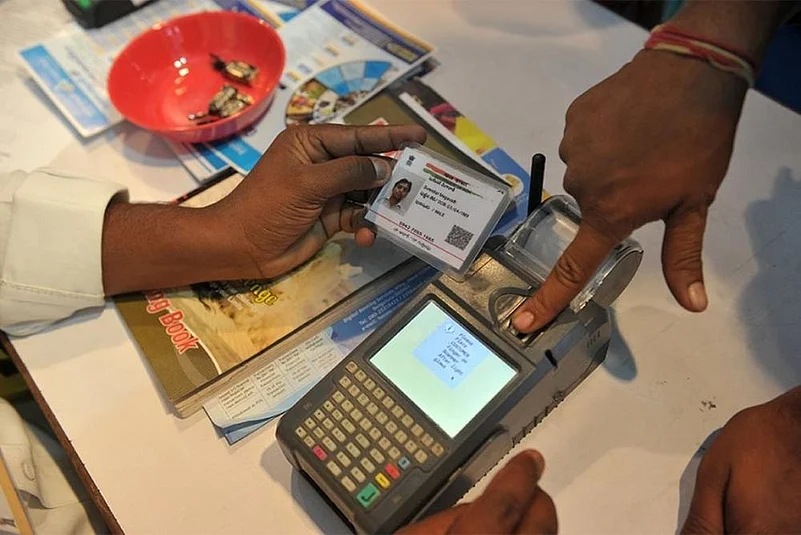A five-judge constitution bench of Supreme Court headed by Chief Justice of India Dipak Misra today began hearing the matter related to constitutional validity of Aadhaar.
The 5-judge bench, comprising Chief Justice Dipak Misra, Justice A K Sikri, Justice A M Khanwilkar, Justice D Y Chandrachud and Justice Ashok Bhushan, will commence the hearing on a range of crucial matters from today.
None of the four judges -- Justices J Chelameswar, Ranjan Gogoi, M B Lokur and Kurian Joseph, feature in the list of members of the 5-judge constitution bench.
Since inception, the validity of the Aadhaar and possible leakage of data has cropped up time and again. The top court has also received petitions regarding the linkage of this 12-digit number with mobile phones, bank accounts and so on, the last date for which was extended to March 31 this year.
While data breach has been widely debated in the recent past, the government had refuted all claims of the same.
Most recently, The Unique Identification Authority of India (UIDAI) decided to enable 'Face Authentication' infusion mode on registered devices by July 1, so that people facing difficulty in other existing modes of verification such as fingerprints, iris, and one-time-password (OTP) could easily authenticate.
A five-judge Constitution Bench headed by Chief Justice Dipak Misra, in an interim order in December last year, also modified its earlier order with regard to linking of Aadhaar with mobile services and said the deadline of February 6 next year for this purpose also stood extended till March 31.
The Supreme Court today will hear the petition challenging the Aadhaar scheme itself.
The deadline of mandatory linking of Aadhaar with various services and welfare schemes has been extended upto March 31 this year.
Recently, a nine-judge constitution bench of the apex court had held that Right to Privacy was a Fundamental Right under the Constitution. Several petitioners challenging the validity of Aadhaar had claimed it violated privacy rights.
Some petitioners in the top court have termed the linking of the Unique Identification Authority of India (UIDAI) number with bank accounts and mobile numbers as "illegal and unconstitutional".
As per the list of business for today, the 5-judge bench will also hear other major cases such as its 2013 judgement re-criminalising gay sex between consenting adults.
The same combination of judges had last year heard various constitution bench matters from October 10, including the power tussle between the Centre and the Delhi government over administrative jurisdiction and a matter relating to passive euthanasia.
This bench would also hear the contentious issue of the ban on the entry of women between 10 and 50 years of age in Kerala's Sabarimala temple and resume hearing a legal query on whether a Parsi woman would lose her religious identity if she marries a man from a different religion.
Another contentious matter relates to the challenge to the validity of a penal law on adultery, which only punishes a married man for having an extra-marital sexual relationship with a woman married to someone else.
The other issues to be dealt with by constitution bench include the pleas, which have raised a question as to when will a lawmaker, facing criminal trial, stand disqualified.
All these matters were earlier referred to larger benches for adjudication by different benches of the apex court.
The daily list of business shows that the two PILs seeking probe into Loya's death are listed before a bench headed by Justice Arun Mishra, against whom aspersions were cast by a senior advocate in public.
In their unprecedented press conference on Friday, the four senior judges of the apex court had mounted a virtual revolt against the CJI, listing a litany of problems, including the assignment of cases. They had also raised questions over listing of PILs concerning Loya's death.
An office bearer of the Supreme Court Bar Association (SCBA) said a copy of their resolution was submitted by its president Vikas Singh to the CJI yesterday, but have not heard anything from the top court as yet.
Singh had expressed hope that all judges of the apex court would consider the SCBA resolution seeking a full court discussion to defuse the crisis plaguing the higher judiciary.
The SCBA, at an emergency meeting on Sunday, had passed the resolution expressing grave concern over the differences of four senior-most judges with the CJI.
It had said that all public interest litigation (PIL) matters, including the pending PILs, should be either taken up by the CJI or be assigned for adjudication to four senior judges who are part of the apex court collegium.
(Inputs from agencies)


























